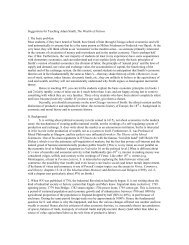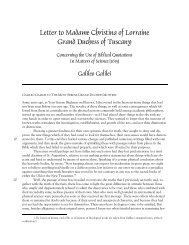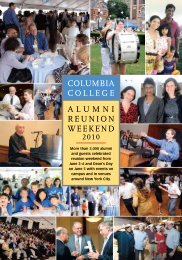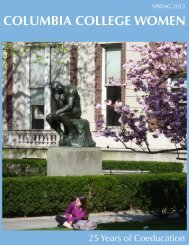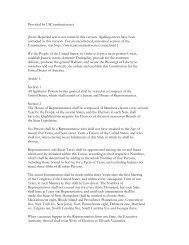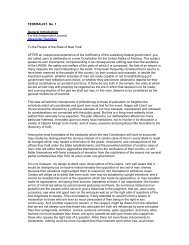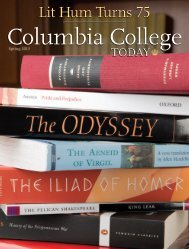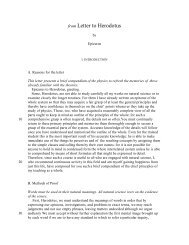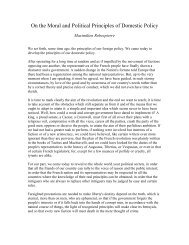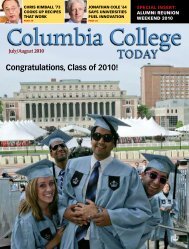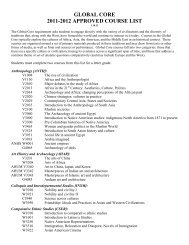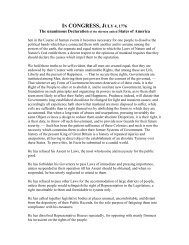Japan Storm - Columbia College - Columbia University
Japan Storm - Columbia College - Columbia University
Japan Storm - Columbia College - Columbia University
Create successful ePaper yourself
Turn your PDF publications into a flip-book with our unique Google optimized e-Paper software.
ABBE LOWELL ’74, ’77L COLUMBIA COLLEGE TODAY<br />
In the wake of the AIPAC case, Lowell has been more forceful<br />
in his defense of clients accused of leaking information, asserting<br />
that it is inconsistent to punish some leakers while the leaking is<br />
encouraged.<br />
“[The] Executive Branch leaks classified information often to<br />
forward several of its goals and then prosecutes others in the same<br />
branch for doing the same thing,” he wrote in a filing in defense<br />
of Stephen Kim, a State Department contractor accused of leaking<br />
information about North Korea to a journalist.<br />
Lowell, the consummate insider, explained to the court the way<br />
that Washington really works: “As the government has imposed ever-more<br />
stringent restrictions on information, while simultaneously<br />
broadening its definition of what constitutes classified information,<br />
leaking has become essential to provide context for messages delivered<br />
to the public through official channels. Although reliance on<br />
a ‘leak system’ is counterintuitive for a nation that prides itself on<br />
open government and places immense value on democratic traditions,<br />
it has become a necessary practice, facilitating the exchange of<br />
information between the government and its constituency.”<br />
That case was only Lowell’s most recent brush with the Espionage<br />
Act, a statute that he’s been grappling with since his time<br />
as a special assistant to the Attorney General in the early 1980s,<br />
when he helped draft some of its associated language. His background<br />
put him on the short list of expert witnesses called before<br />
Congress as it grappled with how to deal with WikiLeaks, when<br />
an Army soldier was accused of leaking hundreds of thousands<br />
of classified military reports to a website.<br />
In December 2010, Lowell appeared before the House Judiciary<br />
Committee. “A meaningful debate about the Espionage<br />
Act and changes to the law are long overdue. However, a current<br />
scandal or crisis is not the time to act too quickly,” Lowell warned<br />
lawmakers. “There is often an urge to address the clamor of the<br />
crisis to show that Washington is listening and doing something<br />
and taking a problem seriously. This can lead to ill-conceived<br />
laws that have unintended consequences that infringe on rights<br />
and cause decades of needless litigation.”<br />
Unlike other Beltway insiders, but like many veterans<br />
of the Core Curriculum, Lowell lives up to the Renaissance<br />
Man ethos. He still reads Shakespeare and sits<br />
on the board of trustees for D.C.’s Shakespeare Theatre<br />
Company. He’s an officer at the Jewish Community Center of<br />
Greater Washington. And he’s run four marathons, the quickest in<br />
four hours.<br />
“I describe him as high-octane and incredibly loyal to his clients,<br />
whoever they are,” says Anne Kornblut ’94, a White House<br />
correspondent for The Washington Post who has known Lowell<br />
for years. They met when Lowell interviewed her when she applied<br />
for admission to <strong>Columbia</strong> in 1989.<br />
For a young, Bronx-born Lowell, there wasn’t much of a choice<br />
when it came to college. He knew that he wanted to be in the Naked<br />
City, and he knew that he wanted to be at the center of the action.<br />
Even before he enrolled in 1970, he’d organized anti-war rallies,<br />
worked for politicians and come to the conclusion — somewhat antithetically<br />
for a young man of his era — that one of the best ways to<br />
fight The Man was to don a suit and join forces with him.<br />
Lowell studied political science at <strong>Columbia</strong> but it was the<br />
classics that caught his interest. He had his “moment of truth”<br />
during his junior year, when he shifted his focus from politics to<br />
Elizabethan literature after a series of particularly engaging classes<br />
with Professor Edward “Ted” Tayler. “Even then he had real<br />
intellectual integrity,” recalls Tayler. “He never wrote cacozelia,<br />
the great vice of both undergraduates and those in my profession.”<br />
Lowell wrote for Spectator, too.<br />
The 1970s were a time of upheaval and social unrest, coming<br />
after a decade of even more unrest. Lowell remembers that he<br />
couldn’t wait to start doing something with his career that could<br />
help make a difference. “It wasn’t that radicalism or demonstrations<br />
had lost credibility, but I was looking for something else,” he<br />
says. “The idea was to work within the system to change the system.<br />
The law allows people a chance to do that. But it doesn’t come<br />
easily. It is hard work.”<br />
Lowell graduated Phi Beta Kappa and magna cum laude before<br />
heading to the Law School as a Harlan Fiske Stone Scholar and serving<br />
as editor of the <strong>Columbia</strong> Law Review. Perhaps predictive of a career<br />
that would see him defend politicians from both parties, Lowell<br />
says he split his time between The Gold Rail (the bar favored by athletes<br />
and more conservative students) and The West End (preferred<br />
by the more liberal crowd) during the early 1970s. And then there<br />
was the iconic Tom’s Restaurant: “I remember those ageless waitresses<br />
who served breakfast to weary students like us,” he says.<br />
Lowell is an equal opportunity lawyer. Throughout his career,<br />
he has split his time between Democratic and Republican col-<br />
Lowell’s background put him on the short list of expert witnesses called<br />
before Congress as it grappled with how to deal with WikiLeaks.<br />
WINTER 2011–12<br />
38<br />
leagues. They include Democratic Rep. Gary Condit, Republican<br />
Rep. Charlie Wilson, ImClone CEO Sam Waksal and actor Seagal.<br />
When the GOP swept into office in 2010, Lowell went on The<br />
Colbert Report television show and joked that he’d ordered ample<br />
amounts of blue and red business cards.<br />
But for all his celebrity, the case he’s most known for is the<br />
defense of President Clinton during his impeachment hearings.<br />
In the case’s final days, Lowell delivered an impressive closing<br />
statement, surely bound for inclusion in some legal textbook.<br />
“Impeachment is not a means to punish the President,” he said<br />
in December 1998. “Impeachment is not a means to send a message<br />
to our children that the President isn’t above the law. There<br />
are better ways to do that. Impeachment is not a vote of confidence<br />
for independent counsel [Ken] Starr. Impeachment is not a<br />
penalty for the President not answering the 81 questions as some<br />
of you would have wished.” Lowell urged the House of Representatives<br />
to find another way to sanction President Clinton for<br />
his misdeeds, but the GOP-led House pushed for impeachment<br />
anyway. Two of four articles of impeachment passed the House<br />
by narrow margins, but both were defeated in the Senate.<br />
For Lowell, defending the rich and powerful has been a “fascinating<br />
experience.” In front of the cameras, celebrities and politicians<br />
are enlarged beyond their stature, but when they are in<br />
trouble and discussing their cases in his modest office, “they are<br />
just as scared and insecure and worried about what will happen<br />
as anyone else. And everyone’s entitled to a fair trial.”<br />
Alex Kingsbury ’04J wrote for US News & World Report from<br />
2004–11. A native of Maine, he currently lives in Washington, D.C.



